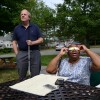A half-century after Marshall McLuhan warned us that our media tools shape who we are (“The medium is the message”), and a half-dozen years after Nicholas Carr lamented that the Internet was undermining our ability to read and think in a linear, coherent manner, Virginia Heffernan has written a book that proves both of them right.
Magic and Loss: The Internet as Art (Simon & Schuster, 272 pages, $26) is an honest-to-God book, with paper, ink, and a binding. (Or so I’ve heard. I downloaded the Kindle version.) Reading it, though, feels more like randomly browsing the web than it does like reading a book.
Look here: An essay on the aesthetics of Instagram and Flickr photography. Click. An argument that closed apps offer a better—yet more elitist—experience than the open web. Click. A discussion of epigrammatic poetry demonstrating that its most influential practitioners would have been right at home on Twitter. (Blaise Pascal’s “Do you wish people to believe good of you? Don’t speak,” published in 1669, takes up just 58 characters.) Click. Newton Minow did all of us a favor by calling television “a vast wasteland,” since it imbued the young medium with the transgressive quality that all great art needs. Click.
But if Heffernan offers us a lot of little ideas, she has a big one as well: that the Internet giveth, and it taketh away. At 46, she isn’t quite a digital native, though she’s certainly more of one than I am. Perhaps more relevant is that she’s been around just long enough to experience the digital revolution in its many forms. The good and bad of life online is clearer to her than it would be to someone 20 years younger.
“The Internet is the great masterpiece of human civilization,” she writes, adding: “As an idea it rivals monotheism.” But even monotheism has its drawbacks. In her chapter on music, for instance, she offers a compelling argument on what has been lost as music was transformed from performers on a stage to tinny, ultracompressed sounds that you listen to on your smartphone. (Click. A diversion into the rise of military headphones in World War II and how returning veterans embraced them as a way to listen to music while tuning out the rest of the family.)
Of course, the assertion that MP3s offer sound quality inferior to the CDs and LPs that preceded them is hardly novel. But Heffernan gives it an unexpected twist, writing that she bought her first iPod around the time of the 9/11 terrorist attacks, and that she welcomed a mechanical tone untethered from the messy reality of how music is actually supposed to sound. (But Norah Jones? Really?) Only later did she realize that she missed “the echo of the chirp of the bassist’s sneakers on the wooden stage as he nervously kicks his foot or the sound of the backup singer’s lungs still metabolizing pot smoke.”
There is more, much more—on the humanistic orientation of technologists like Steve Jobs versus the cold rationality of scientists; on the aesthetic differences between electricity (“the province of the engineer and the rationalist”) and electronics (“the province of the irrationalist, the deconstructionist, the druggie, and the mystic”).
Heffernan ties these disparate strands together in a closing chapter that starts off as annoyingly self-indulgent but ends with a measure of humility and grace. She traces her development from an Episcopalian-turned-Jew-turned-Episcopalian (with detours into something like atheism); as someone who rejected philosophy in favor of literary criticism (she has a Ph.D. in English from Harvard); and as the author of a widely mocked 2013 essay titled “Why I’m a Creationist,” whose ethos (“They say it works even if you don’t believe in it,” she writes, quoting a physicist Twitter friend) remains a guidepost for her.
I started out reading Magic and Loss hoping to glean some ideas that would be useful for my work as a journalist and academic who writes about journalism. What I encountered was an extended meditation on the nature of art and God, on immortality and death. Heffernan has written a book that is by turns frustrating and insightful—and that always aims high.



